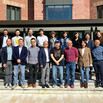Robert Williams and Jamie Horsley Hold Events on Food Safety Risk Communication
Food safety is one of China’s most challenging public health and human rights issues—a topic of paramount significance to China’s leaders and hugely important to the lives of citizens. As part of the China Law Center’s ongoing work in regulatory reform and food safety governance, we co-sponsored a series of workshops in Beijing and Shenzhen the week of May 12 on the topic of food safety risk communication, focusing on the need for improved transparency, public participation and effective mechanisms of interaction between the government and the public.
China Law Center Executive Director Jamie Horsley and Senior Fellow Robert Williams traveled to China for these events with three distinguished experts: Peter Hutt, Senior Counsel at Covington & Burling, Lecturer at Harvard Law School and former Chief Counsel of the U.S. Food and Drug Administration (FDA); William Hallman, Chair of the Department of Human Ecology at Rutgers University, former Director of the Food Policy Institute and current Chair of FDA’s Risk Communication Advisory Committee; and Ji Sun Lee, Director of Risk Communication at FDA. Representing both legal and social science perspectives, these experts brought a wealth of diverse practical experience to bear on the concrete issues of transparency and participatory decision-making at the core of effective risk communication.
Our main workshop on May 13 was organized in cooperation with the dynamic Professor Gao Qinwei, Director of the Center on Food and Drug Law at the Central University of Finance and Economics (CUFE) Law School, whose leading-edge research, advocacy and advisory work emphasizes the importance of risk-based regulation and effective information disclosure. Professor Gao is part of an important group of scholars advising government agencies including the China Food and Drug Administration (CFDA) and the China National Center for Food Safety Risk Assessment on developing a structure and process for improved food safety communication and a more interactive and responsive relationship between the government and the public.
Our program in cooperation with Professor Gao and CUFE afforded an opportunity to hash out these issues among a range of key stakeholders, including representatives from central and local government, academia, the NGO sector, and the media. Our Center’s U.S. experts and their Chinese counterparts gave presentations on various aspects of risk communication, underscoring principles of openness (both of information and also of the process of making decisions and communicating about risks), timeliness and proactive disclosure, being responsive to the specific concerns of the public, tailoring different methods of disclosure for different issues and audiences, the notion of consistency in disclosing information, the need to evaluate communications, and the importance of conveying uncertainty when appropriate. Examination of specific cases and controversial issues helped ensure a practical orientation for the broader principles and reform ideas generated at the event.
The day before our main workshop with Professor Gao, we held a small roundtable discussion with our longtime partner Professor Wang Xixin of Peking University Law School on the topic of risk communication and information as a regulatory tool in promoting food safety and protecting public health. Later in the week, following a half-day meeting and case study session at the China National Center for Food Safety Risk Assessment, our team traveled to Shenzhen for a full-day capstone workshop organized with our recent visiting scholar Professor Ying Feihu of Shenzhen University Law School, and co-sponsored by the Shenzhen Federation of Social Scientists and the Shenzhen Daily newspaper.
The participants at the Shenzhen workshop included government officials from the Shenzhen FDA, Shenzhen Office of Legislative Affairs, and Guangdong FDA, as well as several representatives from the Shenzhen Consumer Association. The deeply engaged group of participants spoke frankly of the progress to date and concrete challenges they face in implementing an effective food safety information regime at the local level. Key principles such as incentivizing corporate compliance through information disclosure, protecting vulnerable populations, and making use of social media to engage the public in the regulatory process were drawn out through a variety of concrete examples our experts offered from their own experience and our Chinese counterparts conveyed through lively exchange.
Our Beijing and Shenzhen workshops were covered by a variety of Chinese media, with positive attention to the platform these events provided for substantive engagement between the Chinese government and civil society on these important issues of food safety law and policy reform.


